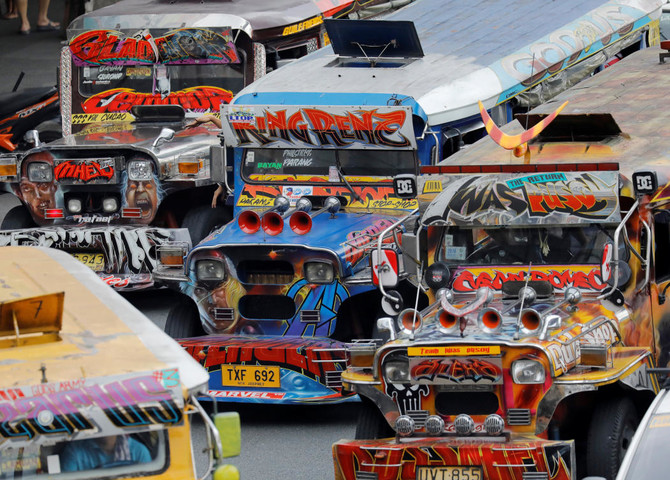MANILA: Jeepneys, the flamboyant passenger trucks of the Philippines, are nearing the end of their reign as the “Kings of the Road,” but they’re not going down without a fight.
Government moves to overhaul outdated public transport, making it safer and more environment friendly, will put the brakes on a mode of travel that has long been the surest and cheapest option in a country of 105 million people.
But the operators and drivers of the 200,000 jeepneys that have plied the nation’s roads and highways for decades are defiant, denouncing moves to oust them as “anti-poor” and a threat to their livelihoods.
“It is a big hassle to us poor people since we are the ones suffering,” said one jeepney driver, upset after traffic police pulled him over because his vehicle was belching black smoke.
Jeepneys have evolved from surplus army jeeps left behind by the US military after World War Two to become brightly-painted vehicles festooned with religious slogans, horoscope signs or family names.
At a cost of 8 pesos ($0.59) for a journey of 4 kilometers in Manila, the capital, they are easily affordable, but the ride is far from comfortable.
A typical jeepney packs in 10 to 16 commuters, sitting knee-to-knee on twin benches, and lacks air-conditioning or windows to shield occupants from the heat, rain and choking fumes.
In Metro Manila, one of Asia’s most gridlocked mega-cities, passengers can sit there for hours.
There are no seatbelts and commuters have only ceiling bars to keep from being thrown off their seats as drivers race to beat traffic lights or edge out competitors for waiting passengers.
The government wants to force unsound and shabby jeepneys off the streets in favor of bigger, cleaner, safer and more modern replacements, some electric, others using cleaner fuel.
But drivers complain that the newer units, priced around 1.8 million pesos, are prohibitively expensive, and government subsidies are paltry.
Some fear vested interests are at play.
“They only want to kick out the operators so they could let corporations take over,” said George San Mateo, head of transport group PISTON, as he led a protest last week outside the transport regulator’s office.
“The government is using this crackdown on dilapidated and smoke-belching jeepneys to force poor operators to buy new ones they cannot afford.”
Regulators have said the plan, backed by President Rodrigo Duterte, aims simply to modernize public transport.
“There’s a lot of public utility jeepneys which are old and dirty, so we have to address it,” Martin Delgra, chairman of the Land Transportation Franchising and Regulatory Board, told reporters.
“We cannot compromise safety when it comes to roadworthiness.”
Healthier ‘King of the Road’ Makes Debut in Manila
MANILA, 5 July 2007 — If tests go well, the Philippines’ “king of the road” known as “jeepneys” would soon become environment-friendly and a regional model.
Tests on the electric-powered minibuses began yesterday in Manila’s financial capital, Makati, and were welcomed with great enthusiasm by a public tired of heavy pollution in the national capital.
“If the project is successful, our hope is that the project will be replicated in other cities in the country and possibly other Asian capitals,” Athena Ronquillo, a Greenpeace energy campaigner and founder of the Green Renewable Independent Power Producer (GRIPP).
Makati Mayor Jejomay Binay, who was present at the launch of the passenger vehicles, said he believed that the project willd not only address the problem of pollution, but will also provide public transport drivers with cheaper fuel alternative.
Binay himself drove one of the two e-jeepneys being tested during the launching ceremonies.
Ronquillo said the e-jeepneys are expected not only to drastically reduce pollution but would also cost less to run.
According to GRIPP, an e-jeepney can run 140 kilometers after eight hours of battery charging at an estimated cost of only 120 pesos or $3, as against the regular jeepneys that guzzle at least 300 pesos ($6.5) of diesel a day.
Introduced after World War II, the usually brightly painted jeepney is the most ubiquitous passenger vehicle in the country.
The early jeepneys used to run on engines taken from US Army weapons carriers and later from knocked-down Japanese-made diesel trucks, which cause a lot of noise and air pollution.
Ronquillo said the iconic jeepney’s colorful design remains “but without wasteful and carbon emitting diesel, while providing increased incomes to the vehicles’ drivers.”
The 14-seater e-jeepneys were designed by Philippine renewable energy firm Solar Electric Company and the engines are made in China.
An e-jeepney costs 550,000 pesos ($11,982), has a 5-horsepower engine powered by batteries that can run up to 120 kilometers per day on a maximum speed of 40 kilometers per hour.
The two vehicles would be plying Makati in the next six months to test their viability.
“The pilot test in Makati is meant to ensure the technical, commercial, environmental and social feasibility of the project,” said Ronquillo. (With input from Agencies)





















